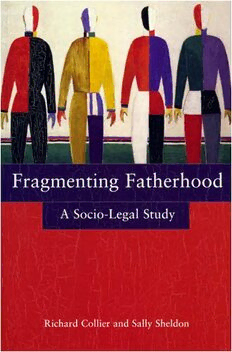
Fragmenting Fatherhood: A Socio-Legal Study PDF
283 Pages·2008·2.878 MB·English
Most books are stored in the elastic cloud where traffic is expensive. For this reason, we have a limit on daily download.
Preview Fragmenting Fatherhood: A Socio-Legal Study
Description:
Discussion of the legal status, responsibilities, and rights of men who are fathers — whether they are married or unmarried, cohabiting or separated, biological or 'social' in nature — has a long history. In recent years, however, western societies have witnessed a heightening of concern about whether families need fathers and, if so, what kinds of fathers these should be. A debate about the future of fatherhood has become central to a range of conversations about the changing family, parenting, and society. Law has served an important role in these discussions, serving as a focal point for broader political frustrations, playing a central role in mediating disputes, and operating as a significant symbolic 'authorized discourse' which provides an official, state-sanctioned account of the scope of paternal rights and responsibilities. Fragmenting Fatherhood provides the first sustained engagement with the way that fatherhood has been understood, constructed, and regulated within English law. Drawing on a range of disparate legal provisions, and material from diverse disciplines, the book sketches the major contours of the figure of the father as drawn in law and social policy, tracing shifts in legal and broader understandings of what it means to be a 'father' and what rights and obligations should accrue to that status. In thematically-linked chapters cutting across substantive areas of law, the book locates fatherhood as a key site of contestation within broader political debates regarding the family and gender equality. Fragmenting Fatherhood provides an important and unique resource and speaks to debates about fatherhood across many fields including law and legal theory, sociology, gender studies, social policy, marriage and family, and women's studies.
See more
The list of books you might like
Most books are stored in the elastic cloud where traffic is expensive. For this reason, we have a limit on daily download.
